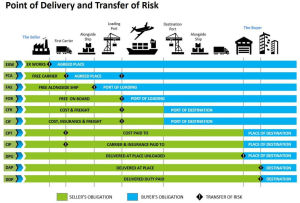Different Of FOB And FCA

Free Carrier (FCA) and Free on Board (FOB) in Incoterms 2020, are two of the most commonly
used terms in the international trading.
This video will cover the differences between FOB and FCA, to help you decide which one is
better for you.
FOB is more limiting since it should only be used for traditional sea freight, while FCA can be used for all types for transport, especially the international multimodal transport.
Both FCA and FOB have the similar rules on customs clearance as follows:
The seller takes charge for the export procedures in the country of origin, including any documentation and costs associated with it.
The buyer is responsible for the import procedures in the country of destination, including any documentation and costs associated with it.
It is the buyer’s duty to book the space under FOB, while it is the seller to sign on the shipping contract under FCA.
The main difference between FCA and FOB Incoterms is the point of risk transfer from the seller to the buyer.
Under FCA, the seller must make the goods available at the agreed location, which can be at the seller’s premises or the port of origin. The moment the goods are delivered and available, the risk transfers to the buyer, which means the buyer is then liable for loading the goods into the vessel.
When shipping under FOB, the seller’s responsibility goes one step further since he must load the goods on the vessel selected by the buyer. In this case, the risk is transferred from the seller to the buyer at the moment when the goods are loaded.
Following FCA terms, the seller is responsible for the costs of the cargo until they are delivered to a specific freight forwarder or “carrier”.
However, under FOB terms, the seller should have to bear all the costs before the cargo loading on board at the loading port.



